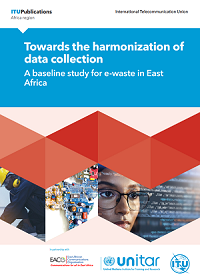
|
This collaborative study “Towards the harmonization of data collection - A baseline study for e-waste in East Africa” between the International Telecommunication Union (ITU) and the United Nations Institute for Training and Research Sustainable Cycles Programme (UNITAR-SCYCLE) in partnership with the East African Communications Organisation (EACO) aims to enhance the quality, collection, and interpretation of e-waste data in East Africa, specifically in Burundi, Kenya, Rwanda, South Sudan, Tanzania, and Uganda.
These countries have made strides in addressing e-waste management issues through regional strategies and policies. However, the need for improved data and statistics persists. This study is an output of the EACO Regional E-waste Data Harmonization project.
|
The study employs two data collection methods. The first calculates data on electrical and electronic equipment (EEE) placed on the market and the amount of e-waste generated, primarily using national data. The second approach involves household and business surveys in Burundi and Kenya, shedding light on EEE possession and disposal habits. For example, mobile phone possession rates are high in both countries, and disposal routes for equipment vary. There's a significant increase in EEE placed on the market in East Africa, leading to a surge in e-waste generation, posing challenges due to limited recycling infrastructure. The usage of the EEE POM and e-waste generated tools by the representatives of the countries participating in the project revealed that EEE POM in East Africa has been rising rapidly in the past years, hitting 170 kilotonnes (kt) in 2021. The rapid increase of EEE POM has caused an increase of e-waste generated in the region, which reached 128 kt in 2021. The rapid increase of e-waste generated represents a challenge in a region where the availability of e-waste recycling infrastructure is limited.
The study emphasizes the importance of regular updates to national e-waste statistics, incorporating new trade and production data. Expanding future surveys for better coverage would help estimate EEE stocks and facilitate policymaking.